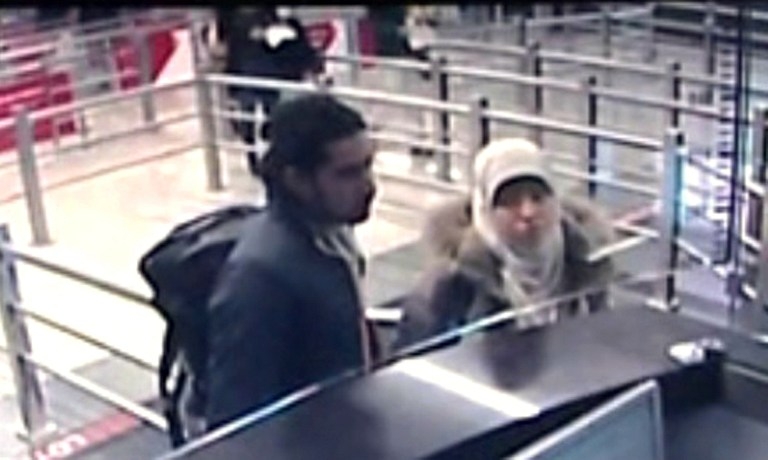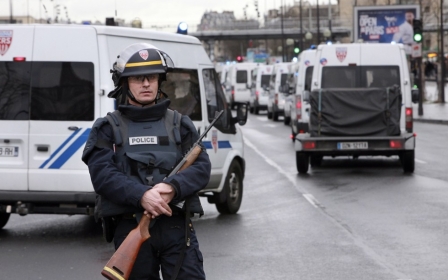Turkey's link to Paris attacks raises new questions

ISTANBUL, Turkey – Hayat Boumeddiene, the wanted partner of Amedy Coulibaly, the gunman behind the attack at a kosher supermarket in Paris that left four people dead last week, has travelled to Syria through Turkey, according to the Turkish Ministry of Foreign Affairs.
Entering Turkey at Istanbul’s Sabiha Gokcen airport on a flight from Madrid on 2 January, Boumeddiene and a man named Mahdi Sabri Belhoucine stayed at Bade Hotel in the Kadikoy district, pro-government daily Yeni Safak reported.
Mevlut Cavusoglu, Turkey’s minister of foreign affairs, stated on Monday that they stayed in Istanbul between 2-4 January, and left Turkey on 8 January. Their whereabouts from 4-8 January remain unclear.
According to Turkish intelligence sources, the pair only left the hotel twice. They acquired a Turkish SIM card from a nearby mobile phone store, and they did not get in touch with any third person during their stay.
Conflicting reports
Twenty minutes by sea from Istanbul’s main tourist attractions, the hotels in central Kadikoy offer budget accommodations. Known for its proud local residents and alternative lifestyle compared to the European side of Istanbul, Kadikoy is a popular neighbourhood with the city’s young and mostly secular residents.
The proprietor of Bade Hotel, who did not want to discuss the recent media reports, owns two hotels of the same name in the neighbourhood.
Overwhelmed with media pressure since the Yeni Safak story broke on Monday, the receptionists at both hotels refrained from commenting to Middle East Eye, but denied the claims that the couple stayed at their establishment.
According to an eyewitness in the area, plain-clothed police or intelligence officers arrived at the hotel around 10pm on 11 January. The eyewitness told MEE that he saw officers checking what he believed to be CCTV recordings.
The Yeni Safak report, which was referred to many times in international media reports, came out only a few hours after the police search at the hotel.
Although hotel representatives repeatedly denied that the couple were their guests, local shopkeepers told MEE that they saw Boumeddiene and Belhoucine in the neighbourhood.
A local shopkeeper told MEE that a hotel employee said he had brought room service to Boumeddiene and Belhoucine at the hotel.
MEE could not independently verify this information.
Intelligence sharing
The killings began on 7 January when brothers Cherif and Said Kouachi stormed the Paris offices of French satirical weekly Charlie Hebdo, slaughtering 12 people.
Coulibaly on 9 January took hostages at a kosher supermarket in eastern Paris which was then raided by police in the evening. The gunman and four hostages were killed. The Kouachi brothers were also killed after a separate hostage-taking incident.
While initial reports alleged that Boumeddiene was present at the grocery store shootout, Turkish officials' comments confirm that she left France before the three-day killing spree began.
The search for Boumeddiene may also point to an intelligence-sharing flaw between NATO member-states, France and Turkey.
According to Turkish intelligence officials, Boumeddiene and Belhoucine were tracked upon their arrival in Turkey after displaying "suspicious behaviour" at the airport.
The Turkish Intelligence Organisation (MIT) reportedly informed French officials about Boumeddiene's moves, but Turkey was not given any information as to the criminal status of the French citizen, Yeni Safak reported.
"We warned the French intelligence agency once we noticed that she was here," Turkish Prime Minister Ahmet Davutoglu said during a press conference with German Chancellor Angela Merkel.
"This woman travelled Turkey from Spain. Could you blame Spain or Turkey in this situation? Is it a crime to have a border with Syria?" Davutoglu said.
Foreign Minister Mevlut Cavusoglu told the press that Turkish officials discovered that Boumeddiene crossed into Syria through her phone records.
In Turkey, foreign nationals must present a valid identification document when buying a cell phone SIM card.
MEE inquired at several mobile phone shops in the vicinity of the Kadikoy hotel Boumeddiene allegedly stayed, but local shopkeepers could neither identify her, nor any other French citizens who recently bought a SIM card.
However, one shopkeeper told MEE that some SIM cards are known as "open lines", meaning that they are registered with other names, and could be easily sold to foreigners to avoid the hassle for passport-based registration.
"They might very well have gotten one of these open lines," a local mobile shop clerk said.
The Turkish press widely reported that the last signal received from her phone registered on 8 January in Akcakale, across from the Syrian border town of Tel Abyad.
New MEE newsletter: Jerusalem Dispatch
Sign up to get the latest insights and analysis on Israel-Palestine, alongside Turkey Unpacked and other MEE newsletters
Middle East Eye delivers independent and unrivalled coverage and analysis of the Middle East, North Africa and beyond. To learn more about republishing this content and the associated fees, please fill out this form. More about MEE can be found here.




